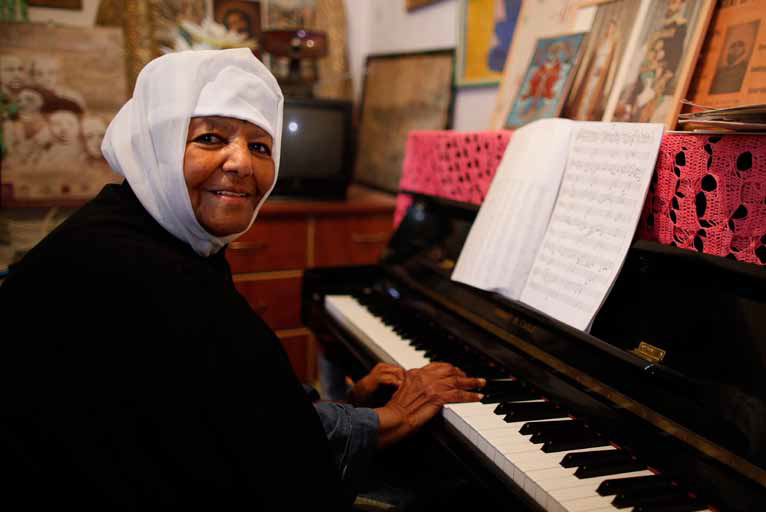Yewubdar Emahoy Tsegué-Maryam Guèbrou was an Ethiopian nun and musician. Her music reflected a life that experienced several unexpected moves as well as a devotional commitment to Christian orthodoxy. Yewubdar was born in Addis Ababa on December 12, 1923, to Kessaye Yelemtu, a relative of Empress Menen, and Kintiba Guèbrou, a governor of multiple provinces in Ethiopia. She and her older sister, Senedu, were the first daughters in their family of twelve to pursue education outside Ethiopia. At six years old, the Guèbrou sisters attended boarding school in Basel, Switzerland. By age eight, Yewubdar performed in violin and piano concerts. Both sisters moved back to Ethiopia by 1936. Fascist Italy’s attempts to colonize Ethiopia in the mid-1930s forced the Guèbrou family into exile for three years. As Ethiopian and British forces drove the Italians out of Ethiopia by 1941, Yewubdar took the opportunity to study with violinist Alexander Kontorowicz in Cairo, Egypt.
During the mid-1940s, Cairo was an influential place and time for classically trained musicians. Yewubdar committed serious study to music, often practicing nine hours daily to perfect her craft. She turned, however, from the violin to the piano to speak closer to her style. Cairo’s torrid climate pushed Yewubdar back to Ethiopia after two years. Upon her return, she sought to go to London to study at the Royal Academy, but the Ethiopian government denied her a travel visa. Yewubdar responded in protest, fasting for twelve days until failing health forced her into a hospital. When she recovered, she moved to the desolate mountain plateau and sacred grounds of Gishen Amba in northern Ethiopia and became a nun. Yewudbar’s name was changed to Emahoy Tsegué-Maryam.
Emahoy returned to Addis Ababa when elephantiasis—attributed to the volcanic ashes inherent in much of Ethiopian soil—drew her back home. Guèbrou returned to music, and in 1963, she wrote and recorded five of her own compositions while on a trip to Germany. The five piano pieces would be called Emahoy Tsegué-Maryam Guèbrou spielt eigene Kompositionen.
Emahoy Guèbrou returned to Addis Ababa and remained there until political unrest during the 1970s forced her into exile in Israel, where she settled in Jerusalem and worked as a translator for the Ethiopian Orthodox Tewahedo Church. However, she continued to compose and record music. Guèbrou’s most widely known recordings were a compilation of piano solos released in 2006, Ethiopiques, vol. 21. Emahoy’s life and music reflected the mixing of her experiences in multiple places in Africa, Asia, and Europe with a profound religious devotion.
Emahoy Guèbrou passed away on March 23, 2023, in Jerusalem at the Ethiopian monastery. She was 99. A well-respected and praised figure, Emahoy Guèbrou’s mantra resonated with many people, “We can’t choose what life brings. But we can choose how to respond.”

